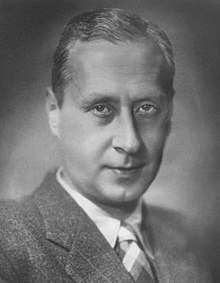Sergei Yutkevich
Sergei Yutkevich | |
|---|---|
 Sergei Yutkevich | |
| Born | Sergei Iosifovich Yutkevich 28 December 1904 |
| Died | 24 April 1985 (aged 80) |
| Occupation(s) | Film director, screenwriter |
| Years active | 1925 - 1980 |
Sergei Iosifovich Yutkevich (Template:Lang-ru, 28 December 1904[1] – 24 April 1985) was a Soviet film director and screenwriter. He was a People's Artist of the USSR (1962) and a Hero of Socialist Labour (1974).
Life and career

He began work as a teen doing puppet shows. Between 1921 and 1923 he studied under Vsevolod Meyerhold.[2] Later he helped found the Factory of the Eccentric Actor (FEKS), which was primarily concerned with circus and music hall acts. He entered films in the 1920s and began directing in 1928. His films often were cheerier than most Russian films as he was influenced by American slapstick, among other things. However he also did serious historical films, docudramas, and biopics.[3]
He won Cannes's Best Director Award twice: for Othello in 1956 and for Lenin in Poland in 1966. Of his later films Lenin in Paris is among the best known. In 1959, he was a member of the jury at the 1st Moscow International Film Festival.[4] Two years later, he was on the jury of the 2nd Moscow International Film Festival.[5] In 1967 he was the President of the Jury of the 5th Moscow International Film Festival.[6]
Filmography
- Lace (Кружева) (1928)
- The Black Sail (Черный парус) (1929)
- Golden Mountains (Златые горы) (1931)
- Counterplan (Встречный) (1932); co-directed with Fridrikh Ermler
- Ankara - Heart of Turkey (Анкара — сердце Турции) (1934)
- The Miners (Шахтеры) (1937)
- How to Vote (Как будет голосовать избиратель) (1937), short
- The Man with the Gun (Человек с ружьем) (1938)
- Yakov Sverdlov (Яков Свердлов) (1940)
- The New Adventures of Schweik (Новые похождения Швейка) (1943)
- Liberated France (Освобожденная Франция) (1944)
- Hello Moscow! (1945)
- Youth of Our Country (Молодость нашей страны) (1946), documentary
- Light over Russia (Свет над Россией) (1947), not released
- Three Encounters (Три встречи) (1948), segment
- Przhevalsky (Пржевальский) (1951)
- The Great Warrior Skanderbeg (1953)
- Othello (1956)
- Stories About Lenin (Рассказы о Ленине) (1957)
- Encounter with France (Встреча с Францией) (1960), documentary
- The Bath House (Баня) (1962), animated
- Lenin in Poland (1966)
- About Human Dignity (О самом человечном) (1967), documentary
- Subject for a Short Story (Сюжет для небольшого рассказа) (1969)
- Mayakovsky Laughs (Маяковский смеется) (1975), animated
- Lenin in Paris (1981)
References
- ^ "Sergei Yutkevich". Retrieved 30 March 2015.
- ^ Багров, Пётр (2004). Советский денди. Сюжет для небольшого романа. Сеанс (in Russian) (21/22). Moscow.
- ^ Allmovie
- ^ "1st Moscow International Film Festival (1959)". MIFF. Archived from the original on 16 January 2013. Retrieved 27 October 2012.
{{cite web}}: Unknown parameter|deadurl=ignored (|url-status=suggested) (help) - ^ "2nd Moscow International Film Festival (1961)". MIFF. Archived from the original on 16 January 2013. Retrieved 4 November 2012.
{{cite web}}: Unknown parameter|deadurl=ignored (|url-status=suggested) (help) - ^ "5th Moscow International Film Festival (1967)". MIFF. Archived from the original on 16 January 2013. Retrieved 9 December 2012.
{{cite web}}: Unknown parameter|deadurl=ignored (|url-status=suggested) (help)
External links
- Use dmy dates from September 2010
- 1908 births
- 1997 deaths
- People from Saint Petersburg
- People from Saint Petersburg Governorate
- Russian Jews
- Soviet film directors
- Soviet screenwriters
- Male screenwriters
- Gerasimov Institute of Cinematography faculty
- People's Artists of the USSR
- Heroes of Socialist Labour
- Recipients of the Order of Lenin
- Stalin Prize winners
- Recipients of the USSR State Prize
- Soviet film director stubs
